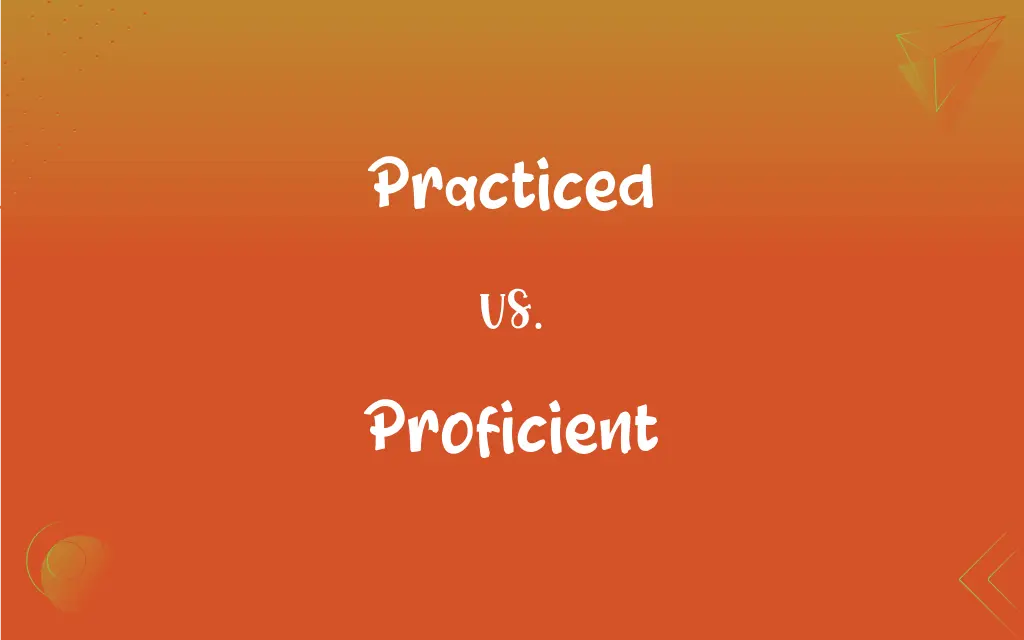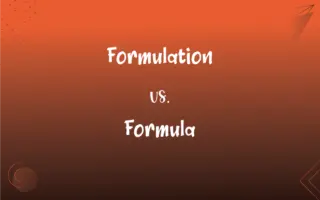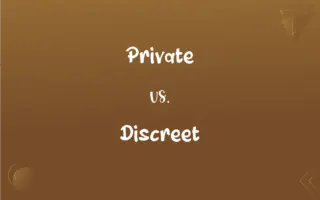Practiced vs. Proficient: What's the Difference?
Edited by Aimie Carlson || By Janet White || Updated on September 28, 2023
Practiced refers to having repeated experience in or aptitude for a skill; Proficient means possessing a high degree of knowledge or skill in a particular field.

Key Differences
Practiced and Proficient are adjectives denoting a person’s skill level, but they imply different stages of learning and mastery. Practiced implies that an individual has had repeated practice or exercise in a particular skill, suggesting experience and familiarity. On the other hand, Proficient signifies a high degree of skill or expertise in a specific area, denoting mastery and excellence.
While a practiced individual has engaged in repeated activity or exercise to improve their skill, it doesn’t necessarily mean they have attained mastery or excellence in that field. Proficient individuals, in contrast, have reached a level of expertise and knowledge that allows them to execute tasks with high competence and efficiency. Proficiency generally implies a deeper understanding and capability in the skill or field than being merely practiced.
In the realm of learning and skill acquisition, being practiced is often a step in the journey towards becoming proficient. It is the consistent and repeated engagement in a skill that builds familiarity and begins to hone the ability. Conversely, being proficient is often the goal, where one has not only familiarity but also efficiency, accuracy, and comprehensive knowledge in performing a specific skill or task.
A practiced individual may still be in the process of learning and perfecting their skill, implying a certain dedication to improvement. Proficient individuals, however, have already demonstrated a high level of competence and understanding, showcasing not only dedication but also accomplishment in their field. The proficiency reflects not just practice but effective learning and mastery in a particular domain.
Comparison Chart
ZLevel of Skill
Implies experience and familiarity
Denotes mastery and excellence
ADVERTISEMENT
Implication
Repeated practice or exercise in a skill
High degree of knowledge or skill
Stage of Learning
A step in the journey towards proficiency
The goal, reflecting accomplishment and comprehensive knowledge
Dedication to Improvement
Still in the process of learning and perfecting
Have demonstrated high competence and understanding
Knowledge and Understanding
Indicates familiarity through repeated engagement
Implies efficiency, accuracy, and comprehensive knowledge in a domain
Practiced and Proficient Definitions
Practiced
Skilled through repeated practice.
She is a practiced pianist, playing every day to hone her skills.
ADVERTISEMENT
Proficient
Able to perform a task or activity with excellence and efficiency.
The team was proficient, completing the project ahead of schedule.
Practiced
Experienced in performing a particular task or skill.
As a practiced speaker, he effectively engaged the audience.
Proficient
Highly competent in a skill or field.
She is proficient in three languages, speaking each fluently.
Practiced
Exhibiting proficiency in a skill due to repeated application.
The chef's practiced knife skills were evident in the finely chopped vegetables.
Proficient
Having or showing advanced knowledge or expertise.
The proficient programmer easily resolved the intricate software issues.
Practiced
Having experience and skill in a specific field due to continuous practice.
Her practiced hand created exquisite paintings with ease.
Proficient
Demonstrating a high level of capability and accuracy in a specific field.
Her proficient analytical skills were crucial in data interpretation.
Practiced
Skilled or expert; proficient
He is practiced in the art of design. She is a practiced lecturer.
Proficient
Skilled and educated in a particular area or activity.
As a proficient guitarist, he played complex compositions effortlessly.
Practiced
Acquired or brought to perfection by practice
Greeted the guests with practiced courtesy.
Proficient
Having or marked by an advanced degree of competence, as in an art, vocation, profession, or branch of learning.
Practiced
Skillful, proficient, knowledgeable or expert as a result of practice
Proficient
A person who exhibits such competence; an expert.
Practiced
Simple past tense and past participle of practice
Proficient
Good at something; skilled; fluent; practiced, especially in relation to a task or skill.
He was a proficient writer with an interest in human nature.
Practiced
Experienced; expert; skilled; as, a practiced marksman.
Proficient
An expert.
Practiced
Used habitually; learned by practice.
Proficient
One who has made considerable advances in any business, art, science, or branch of learning; an expert; an adept; as, proficient in a trade; a proficient in mathematics, music, etc.
Practiced
Having or showing knowledge and skill and aptitude;
Adept in handicrafts
An adept juggler
An expert job
A good mechanic
A practiced marksman
A proficient engineer
A lesser-known but no less skillful composer
The effect was achieved by skillful retouching
Proficient
Well advanced in any branch of knowledge or skill; possessed of considerable acquirements; well-skilled; versed; adept,
Practiced
Skillful after much practice
Proficient
Having or showing knowledge and skill and aptitude;
Adept in handicrafts
An adept juggler
An expert job
A good mechanic
A practiced marksman
A proficient engineer
A lesser-known but no less skillful composer
The effect was achieved by skillful retouching
Practiced
Accomplished in a skill through repetition and training.
With his practiced approach, he solved complex math problems swiftly.
FAQs
Can a practiced individual also be proficient?
Yes, a practiced individual can become proficient through continual learning and experience.
Can proficiency be achieved without being practiced?
Typically no, proficiency generally requires extensive practice and learning.
Can one be practiced in multiple skills?
Absolutely, one can be practiced in various skills through repeated engagement and experience.
Does proficient mean expert?
Yes, proficient often denotes a high level of expertise in a specific field.
Is every practiced individual proficient?
Not necessarily, being practiced implies experience but not necessarily mastery or high competence.
Does being proficient require continual learning?
Yes, maintaining proficiency often requires continual learning and adaptation to advancements.
Is being practiced a phase in learning?
Yes, it’s often a stage in learning where individuals are building familiarity and honing their skills.
Does proficient imply mastery?
Yes, being proficient generally denotes mastery and a high level of competence.
Does being practiced mean being knowledgeable?
It implies some level of knowledge gained through experience but not necessarily comprehensive knowledge.
Can proficiency be measured?
Yes, proficiency can often be measured through assessments and evaluations of competence and knowledge.
Is proficiency static, or can it be improved?
It can be improved; individuals can continually enhance their proficiency through learning and experience.
Can proficiency be lost over time?
Yes, proficiency can decline without continual practice and engagement in the skill or field.
Does being practiced in a skill imply proficiency?
Not always.
Is being practiced a prerequisite for proficiency?
Generally yes, consistent practice is typically necessary to achieve proficiency.
Can being practiced lead to improvement?
Definitely, repeated practice is a fundamental method for improvement and learning.
About Author
Written by
Janet WhiteJanet White has been an esteemed writer and blogger for Difference Wiki. Holding a Master's degree in Science and Medical Journalism from the prestigious Boston University, she has consistently demonstrated her expertise and passion for her field. When she's not immersed in her work, Janet relishes her time exercising, delving into a good book, and cherishing moments with friends and family.
Edited by
Aimie CarlsonAimie Carlson, holding a master's degree in English literature, is a fervent English language enthusiast. She lends her writing talents to Difference Wiki, a prominent website that specializes in comparisons, offering readers insightful analyses that both captivate and inform.
































































